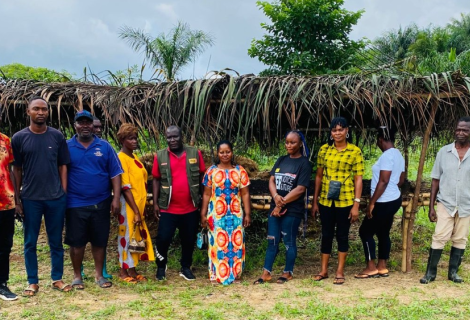Women Leading the Way: Khulima Organic Farming Site Brings New Hope to Rural Farmers in Bong County

Khulima Women’s Organic Demonstration Site is empowering smallholder women farmers by teaching them sustainable farming practices.
At the outskirt of Gbarnga City, The Khulima Organic Farming Demonstration site is making a big turning point. It is not just growing crops, but also transferring skills and giving local farmers new vision for farming in a more sustainable way.
The Khulima Women’s Organic Demonstration Site is empowering smallholder women farmers by teaching them sustainable farming practices. This initiative aims to help them increase their harvests while successfully adapting to challenging climatic conditions.
The demonstration site is part of the is part of a bigger effort under the Medium Partnership Project (FMP), which focuses working with local farmer to strengthen their capacity and help them to adapt to the changing to engage into climate-friendly farming.
Last week, farmers from nearby towns; SKT, Bellefanai, and Pea Body visited the site to see first-hand how organic methods of farming works, and the new mode of cassava, yam, plantains and vegetables cultivation without the use of harmful chemicals in order to help them transition to this new mode of climate-friendly way of farming.
“This demonstration site is necessary. It will serve as a practical learning center for organic farming,” said Juba Jackson, a woman farmer from SKT.”
She added “We’ve been hearing about organic methods, but now we can see and learn for ourselves. I’m encouraging other farmers to see organic farming to increase our yields without destroying the soil.” Juba told other farmers who visited the site.
Like many other women farmers in Liberia, Juba had previously faced serious challenges farming on poor soil, changing weather, and the lack of support to take her farming to another level for better yields, but with this project Juba’s farming has shifted to a more productive and climate friendly farming.
Juba says she no longer worries about fear of climate change impacts on her farming, because according to her she now has the right tool, knowledge and education on what it takes to continue farming in a more sustainable way.
In Liberia, about 60% of vegetable farmers in are females; however they often have the least access to land, tools, and training and lack the adequate knowledge of how to adapt to the changing climate to enable them transition.
ActionAid Liberia’s work aims to change all these by putting women at the center of farming decisions and providing them the right support to help women, and marginalized group to strive.
Garmai Vargbeh, a vegetable grower from Chief Compound community, another beneficiary of ActionAid Agroecology project thanked ActionAid for the support which she said has shifted and taken her farming to another level calling for more support to women farmers and additional sites.
“We need more of these demonstration sites in faraway communities. It will help more farmers, especially women, to learn new ways to farm and also understand climate change.”
Routinely, The Khulima Farming group trains extension officers and representatives from Liberia Farmers Union and other Cooperatives leading hands-on training sessions to teach farmers about: crop diversity, growing different types of crops to improve soil and protect against pests, soil health using compost, mulching, and cover crops to keep the soil fertile among other things.
The project is currently working with 45 lead farmers, each helping at least six other farmers, to reach over 300 smallholder farmers in Bong, Gbarpolu, and Rural Montserrado Counties.
Romeo Kaydea, ActionAid Program officer in Bong Liberia staff working with local farmers across Bong County said “This project is about more than planting.” he said and went on to add saying “It’s about building strength in our communities especially for women so they can fight climate change, feed their families, and protect the land, and have sustainable incomes.”
In the last four year, the effects of climate change are visible across Liberian farming communities. Farmers have been hit the hardest. One in four rural households in Liberia is food insecure, and many families live on less than $1.90 a day according to the World Bank.
Women, who often grow food for the household, suffer the most when there’s extreme rain fall, pests’ infestation, or soil failure. =
With support to farmers under this Agroecology project, ActionAid Liberia works closely with the Ministry of Agriculture, Environmental Protection Agency, and Ministry of Gender, as well as community-based organizations and youth networks.